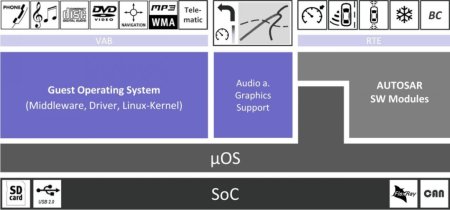“Car OS” links Linux with telematics systems
Feb 5, 2009 — by Eric Brown — from the LinuxDevices Archive — 17 views OpenSynergy is readying a Linux-based “car operating system” and an Intel Atom-based evaluation board for automobile infotainment systems. The COQOS platform aims to let Linux-based infotainment applications and AUTOSAR-compliant telematics modules share the same system-on-chip processor, which is virtualized by a “micro… operating system” (μOS) layer.
OpenSynergy is readying a Linux-based “car operating system” and an Intel Atom-based evaluation board for automobile infotainment systems. The COQOS platform aims to let Linux-based infotainment applications and AUTOSAR-compliant telematics modules share the same system-on-chip processor, which is virtualized by a “micro… operating system” (μOS) layer.
Interestingly, the technology is said to enable both Linux and AUTOSAR apps to share a common audio and OpenGL graphic layer, enabling AUTOSAR applications to output to multimedia displays and audio for the first time, says the company. Additional touted benefits of the approach include reducing the count of ECUs (engine control units), minimizing development costs, and even increasing fuel efficiency, by reducing the weight associated with multiple, separate vehicular computer networks.
COQOS integrates a real-time micro operating system, μOS, to partition a single SoC into multiple virtual machines (VMs). The arrangement is claimed capable of partitioning a Linux-based infotainment platform from AUTOSAR operations, which is required for safety reasons.

COQOS architecture
(Click to enlarge)
AUTOSAR (AUTomotive Open System ARchitecture) is an open, standardized automotive software architecture, jointly developed by automobile manufacturers, suppliers, and tool developers, says the AUTOSAR organization. It is said to be designed for the development of vehicular software, user interfaces, and management for all application domains.
With COQOS, the μOS micro-kernel “plays the role” of the AUTOSAR OS required by the AUTOSAR compliant software that controls internal automobile functions, OpenSynergy says. Thus, AUTOSAR modules would likely have to be ported to the environment. Few details seem to be available about the OS, although a similar open source project evolved several years ago from the “TelemetryBox” project. Both projects appear to be defunct now, at least as open source efforts.
IPC (interprocess communication) between AUTOSAR and Linux environments is provided by runtime environments (RTEs) that presumably run within each stack. A Virtual Application Bus (VAB), meanwhile, is said to handle communications between Linux infotainment applications.
Features listed for the COQOS framework are said to include:
- AUTOSAR 3.1 Basis Software
- AUTOSAR 3.1 RTE Generator
- Processor Resource Management
- Communication interface between AUTOSAR and infotainment
- Firewall between infotainment and AUTOSAR
- Linux 2.6
- Middleware for infotainment applications
- OpenGL graphic support
- Fast-boot mechanism
- Software updates
The framework supports both x86 and ARM architectures, says OpenSynergy. The company does not appear to have more information on the Intel Atom evaluation board at this time.
One company currently shipping Atom-based boards targeting automotive systems is Congatec, which in December launched an IVI (in-vehicle infotainment) Starter-kit based on a COM Express module with a netbook-like chipset, with added CAN bus and other automotive goodies. The Congatec Starterkit is promoted for use with the Intel-sponsored Moblin Project's IVI software, although software is currently not included in the Kit, according to reports from developers on Moblin's mailing list. Wind River announced in May of last year it planned to drive IVI development and also commercialize the stack, but apparently has not yet merged its work with the IVI project, perhaps suggesting its customers have not yet begun distributing the software. (More details on Congatec's IVI Starter Kit to follow shortly).
OpenSynergy has launched an “ECO Partner Program” that can be joined on several levels. The company provides “ECO Partners” with basic access to products and installation support. “Premium ECO Partners,” meanwhile, are expected to port COQOS, as well as promote joint solutions to potential customers.
Stated Frank-Peter Bohm, CEO of OpenSynergy, “COQOS meets different market trends: Reducing cost in system development and hardware components notwithstanding increasing demand in automotive functions. We think that modern processors [like] the Intel Atom processor are going to play an important role in that constellation.”
Availability
OpenSynergy is close to offering release 1 of COQOS and its Intel Atom evaluation board, says the company, and will show COQOS 1.0 and the Intel Atom board at the the CeBIT 2009, March 3-8 in Hannover, Germany, at Intel Pavilion P33.
This article was originally published on LinuxDevices.com and has been donated to the open source community by QuinStreet Inc. Please visit LinuxToday.com for up-to-date news and articles about Linux and open source.